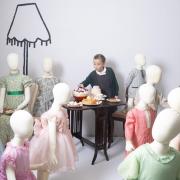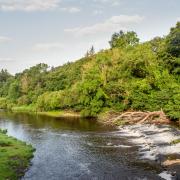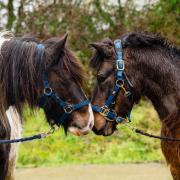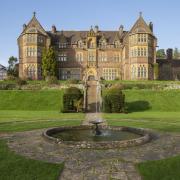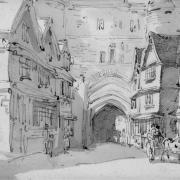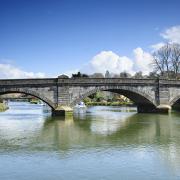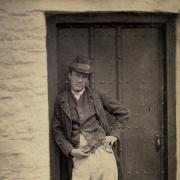It is a hundred years since the death of pioneer conservationist and author William Henry Hudson. Biographer Conor Mark Jameson has been investigating the ancestral draw of Devon for this revered yet unassuming writer
William Henry Hudson’s life in England began on a bright, early May morning in 1874, when he stepped off a ship at Southampton. He was 32 years old, and had come from South America to the land of his ancestors, to seek his fortune as a naturalist. He felt particularly drawn to Devon, as his paternal grandfather – who had emigrated to America around the turn of the 19th century – was from the village of Clyst Hydon.
Hudson called Exeter his ‘natal city,’ and its river beguiled him. ‘Before I knew it the Exe was a beloved stream… My forefathers had dwelt for generations before it, listening all their lives long to its music, and when they left it they still loved it in exile, and died at last with its music in their ears.’ Hudson also felt he ‘doubtless had some inherited memory of it; or how came I to have this feeling, which made it sacred, and drew me to it? We inherit not from our ancestors only, but, through them, something, too, from the earth and place that knew them.’

Before he was born in 1841, W. H. Hudson’s parents had moved from New England to Argentina to find a better life as ranchers on a new frontier. Twenty years after his arrival in England – when at last he had found some success as an author and could afford it – one of the first long expeditions Hudson launched from his London home was to Devon, drawn back in part by that atavistic feeling for the county.
Hudson was by this time helping to establish the Society for the Protection of Birds, of which he was the only male founder among a group of determined women focused on saving wild birds from widespread and wholesale destruction. On that first odyssey in Devon, in spring 1895, Hudson explored Exmoor. He then took a horse-drawn coach to Lynton and Simonsbath, before tramping from Exford to Dulverton. Hudson was keen to understand the losses of so many bird species. A gamekeeper he spoke to on Exmoor told him he had killed 52 ravens in one year, and seen the species diminish until now there were none.

To find surviving ravens Hudson travelled to the sea cliffs at Beer Head. ‘I spent hours of rare happiness at this spot in watching the birds,’ he wrote in an essay about his explorations. ‘After some hours of walking with not a little of uphill and downhill, I began to find the heat well-nigh intolerable. I was on a hard dusty glaring road, shut in by dusty hedges on either side. Coming at length to a group of two or three small cottages at the roadside, I went into one and asked for something to quench my thirst – cider or milk. There was only water to be had, but it was good to drink, and the woman of the cottage was so pretty and pleasant that I was glad to rest an hour and talk with her in her cool kitchen.’

He enjoyed his time at Branscombe so much, it pained him to leave. ‘When I had climbed to the summit of the great down on the east side of the valley and looked on the wide land and wider sea flashed with the early sunlight I rejoiced full of glory at my freedom. Pausing on the summit to consider which way I should go, inland, towards Axminister, or along the coast by Beer, Seton, Axmouth, and so on to Lyme Regis, I turned to have a last look and say a last good-bye to Branscombe and could hardly help waving my hand to it.’
Hudson shared this deep-rooted family connection to Devon with fellow author and literary giant John Galsworthy, who also had Devonian heritage, and moved back to live in a farmhouse at Manaton. The Nobel Prize-winning Galsworthy thought Hudson ‘a very great writer; and – to my thinking – the most valuable our age possesses’.
Although many of his fellow authors (including Virginia Woolf and Joseph Conrad) recognised his gifts, literary acclaim came late in life for Hudson. He finally found a mass readership and ‘broke America’ with his novel Green Mansions, and John Galsworthy heaped further praise on ‘old Huddy,’ as he fondly called him. Himself a stout defender of humanitarian and animal welfare causes, Galsworthy admired Hudson’s ‘love for simple folk and simple things, his championship of the weak, and the revolt against the cagings and cruelties of life, whether to men or birds or beasts’.

‘Of all living authors – now that Tolstoi has gone,’ Galsworthy wrote, ‘I could least dispense with W. H. Hudson. Why do I love his writing so? I think because he is, of living writers that I read, the rarest spirit, and has the clearest gift of conveying to me the nature of that spirit.’ Ten years after the first publication of Green Mansions Hudson’s belated success and acclaim as an author were such that he could afford to winter regularly in the South West. When he travelled by Great Western Railway – the Riviera Express as he dubbed it – he invariably took time to enjoy Exeter. ‘It is one of my favourite towns, and I like to haunt the Cathedral,’ he told a friend.
As it afforded an even better view of the landscape, occasionally he would take his seat in the chauffeur-driven car of his close friend Margaret Brooke – the celebrated Ranee (or Queen) of Sarawak – a vast kingdom in Borneo. In spring 1915 he described their car failing on the steep hills of Exmoor, and having to take a longer route. Later that year he wrote to thank her for ‘a lovely drive in October over vast downs, through “coloured woods” by ancient glorious Fanes – Salisbury and Exeter – the very names are like Beulah, and the City Beautiful – and are our Meccas and Medinas of our soul’.
With war now come, there was further reason to be out of London, and his sojourns on the ‘riviera’ became longer and more frequent. Towards the end of the war, Hudson had fever, and was visited by John Galsworthy and his wife Ada as he convalesced, under the watchful eye of Margaret Brooke.
After the fearfully cold winter of early 1917, Hudson described the late spring flowering of Devon’s orchards. ‘The apple has not come to its perfection this season until the middle of May; even here, in this west country, the very home of the spirit of the apple tree!’ He thought these orchard blossoms ‘like all other sights in nature which wake in us a sense of the supernatural’.

The following year, while at Exeter again, he had a late-life daydream of visiting or revisiting his grandfather’s village. ‘Lying awake at six o'clock last October… I only dozed and was in the twilight condition when the mind is occupied with idle images...’ Although nearly 80 years old, and in failing health, he had a sudden urge to find the place again. ‘I wouldn't ask my way of anyone, just because it was Clyst Hydon, because the name of that little hidden rustic village had been written in the hearts of some who had passed away long ago, far far from home: how then could I fail to find it? it would draw my feet like a magnet!’
He now recalled searching for it not long after he arrived in England more than 40 years earlier. ‘I remembered how I searched among deep lanes, beyond rows and rows of ancient hedgerow elms, and how I found its little church and thatched cottages at last, covered with ivy and roses and creepers, all in a white and pink cloud of apple blossoms.’
‘Searching for it had been great fun and finding it a delightful experience; why not have the pleasure once more now that it was May again and the apple orchards in blossom? No sooner had I asked myself the question than I was on my bicycle among those same deep lanes, with the unkept hedges and the great hedgerow elms shutting out a view of the country. And as on the former occasion, years ago it seemed, I would not enquire my way of anyone. I had found it then for myself and was determined to do so again.’
The sun was setting when a cluster of cottages appeared before him in the twilight. ‘"This is it!" I cried. "This is my little lost village found again, and it is well I found it so late in the day, for now it looks less like even the loveliest old village in Devon than one in fairyland, or in Beulah…” People came out from the houses to gaze at me, and they too were like people glorified with the sunset light and their faces shone as they advanced hurriedly to meet me, pointing with their hands and talking and laughing excitedly as if my arrival among them had been an event of great importance.’
The moment was fleeting. After a brief communing with the villagers, his vision faded. ‘I lifted my eyes and they were gone – the radiant beautiful people who had surrounded and interrogated me, and with them their shining golden village, had all vanished. There was no village, no deep green lanes and pink and white clouds of apple blossoms, and it was not May, it was late October and I was lying in bed in Exeter...’
Hudson made it back to London via Exeter for what would be his final summer in 1922. The happy part is that he lived just long enough to see his beloved ‘Bird Society’s’ three decades-long campaign to end the trade in wild bird plumage finally become law, and the first meeting in London of what would become BirdLife International. His vision was ever global, as well as profoundly local. Hudson has been widely regarded as a mystic, and some of the unanswered questions of his life have long intrigued admirers of his writing. I sense that there is more yet to discover about the Devon origins of Hudson, and the grandfather who left his heart in Clyst Hydon.






